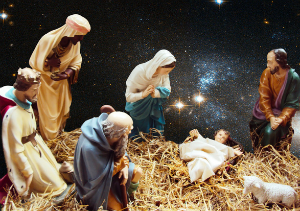Exploring advent - and its mission significance
Israel Olofinjana looks at how the various gospel accounts describe the birth Jesus, and what it means today
As we begin to count down towards Christmas, it is important to reflect on the season when Jesus was born. This is traditionally known as Advent from the Latin word adventus, which was translated from the Greek word Parousia. Parousia describes the coming of Jesus, but it also means presence and signifies the presence of God with us. The New Testament writers, while they did not use the word advent because they were primarily writing in Greek and not Latin, talk about the parousia of Jesus in two stages.
 |
|
Star-lit night, Newsham, RGB Stock |
The first stage was his birth and the ushering in of God’s kingdom on earth. The second is when he will come again and begin the end. I want to focus in this article on the first coming of Jesus.
The various New Testament writers describe this coming in different ways. Matthew tells us he was born of a virgin, interpreting and applying Isaiah’s prophecy in Isaiah 7:14. Matthew went further to tell us how significant Jesus' birth was by the visit of the Magi, who in some traditions are regarded as Kings. They brought gifts to Jesus, all of which are very symbolic in terms of his ministry and mission as the Messiah.
While Matthew was weaving the birth narratives explaining it in relation to the Old Testament, Luke on the other hand, appears to be describing the coming of Jesus in terms of political history. Luke was the one gospel writer to mention there was a census that led to Jesus' family going back to their home town of Bethlehem. In addition, he mentioned the political powers of the day, grounding the birth of Jesus in historical context.
Luke, however, had more than a historical Jesus in mind as he mentioned that this Messiah was actually born in a horse’s stable, the lowest of low places and an unlikely place for a King to be born. This contrasts Jesus with the Caesars or the Herods who were Kings ruling from a vast palace.
Luke also tells us that some classless group of people came to visit Jesus. These were the shepherds, the commoners in those days. The choir of angels appear to have organised the first carol service for them in order that they might go and see Jesus!
While Matthew and Luke explain Jesus' first coming in terms of his birth, Mark and John appear to skip this birth narrative. Mark started his Gospel with an introduction of Jesus as the Son of God, followed by the ministry of John the Baptist bearing witness to Jesus’ identity as the Messiah.
John follows a similar path, but also examines the origins of Jesus before he was born as a child. This beginning of Jesus, John asserts, is the beginning of God (see John 1:2). While John would have been aware of Jesus birth stories, he did not preoccupy himself with that as he wanted to demonstrate that Jesus was eternal before his birth. He also appears to clarify perhaps some confusion around who the Messiah was - Jesus or John the Baptist - by explaining that John came to bear witness to Jesus.
The climax of John’s understanding of Jesus' coming was his description of Jesus becoming human and living with us, like one of us (John 1:14). This is usually regarded as the incarnation, that is, God becoming human.
I want to suggest that the church continues the first advent or coming of Jesus as we have been charged to continue the mission of Jesus (Matthew 28:18-20). In fact, it is continuing this mission that will lead to the second stage of Jesus coming.
The big question is how does the church continue to make Jesus human to our neighbours, work colleagues, friends and families so that they can at least touch his humanity and feel that he is real? For this to happen, we as Christians must first of all be human and real to people. We cannot afford to adopt some form of heavenly language that does not touch on real life situations that people face, or live a lifestyle that says something different from what we preach.
People are looking for real people, so let's keep it real this Christmas so that Jesus can once again become (or continue to be) human!
The Revd Israel Olofinjana is the minister of Woolwich Central Baptist Church and Director of the Centre For Missionaries from the Majority World
Baptist Times, 16/12/2014